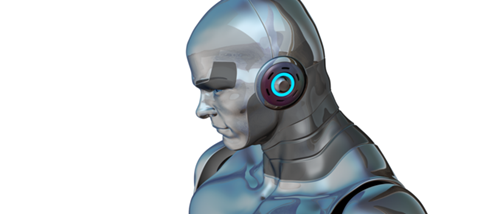James Mildred says churches need to start discussing the implications of Artificial Intelligence before it's too late

The Bank of England is predicting that the rise of artificial intelligence (AI) will have “dark” consequences for the UK, in terms of job losses on a scale even greater than previous industrial and technological revolutions.
Andy Haldane – the Bank’s chief economist – was on the Today programme this week telling Britain that the fourth industrial revolution would lead to humans being replaced by robots on a large scale and significant societal changes.
According to Haldane the first three industrial revolutions involved machines replacing humans who were doing manual tasks. What’s new in this fourth revolution is that AI will replace humans doing thinking tasks.
So, it's not just lorry drivers and cleaners who will find themselves surplus to requirements, but also doctors, lawyers and academics.
It might seem strange to some that the Bank of England is making prophetic announcements about AI and the future of our job market. But estimates suggest over the next two decades 20 – 40 per cent of UK jobs could be lost to AI.
There’s a real danger that unless we start engaging with AI and its ethical implications now, we will sleepwalk into a post-work society where millions of people will find themselves completely unsure about how to use their time. According to Nigel Cameron in his book The Robots are Coming: Us, Them and God this question about the use of time in a post-work society is the most difficult of all.
In the past, industrial revolutions did result in machines taking jobs, but it also created them. Cameron says experts think this time it will be different. The sophistication of AI means more jobs will be lost than created. The result: more leisure time for people to fill.
As the largest third-sector voluntary organisation in the world, the Church is better placed than anyone or anything to speak into this debate. Volunteering could become even more essential in our future.
In Parliament, there is one MP who has been at the forefront of speaking about AI and the future. Jon Cruddas, Labour MP for Dagenham and Rainham has been something of a lone voice on these issues. He is especially concerned about the impact of AI on the jobs market. In his latest article for Unherd, he warns that the risks of mismanaging AI are “phenomenal”.
But Cruddas also thinks the time has come for a debate about the moral implications of increasing dependence on AI and robotics. At a conference organised by CARE on robotics in July, he argued persuasively that principles had to come before policy.
The debate Cruddas is calling for is long overdue. The problem at the moment is that we have effectively delegated responsibility for AI to tech evangelists who are perhaps less concerned about the moral implications of their work.
So what do we have to say as Christians? Can we really be satisfied with the reality of a post-work society?
In the Christian worldview work is good because it is part of God’s original plan and design for us and for the world.
Our work, then, is from God and for God and as such, no matter how mundane it is, or which sphere it encompasses, it carries a unique glory. Does the prospect of a post-work society mean that we are undermining both the value of work but also the true nature of what it means to be human?
We need to start asking the right questions before it is too late. Does the rise of AI undermine human identity? What are the limits to AI and its involvement in the job market? As more jobs are lost, what’s our message to those left without work? Most crucial of all is this: what will people do with their time?
We don’t at this stage need to pretend we have all the answers. But we do need to start getting the conversation started in our churches because the fourth industrial revolution is already looming.
CARE’s recent For the Sake of the Future conference was all about opening up a debate on robotics, AI and the future. The talks are all available online, and they include speakers such as technology expert Nigel Cameron, Labour MP Jon Cruddas and theologian John Lennox. It is vital we start to engage now because you can be sure of this: the robots are coming and it’s up to us to be ready.


































